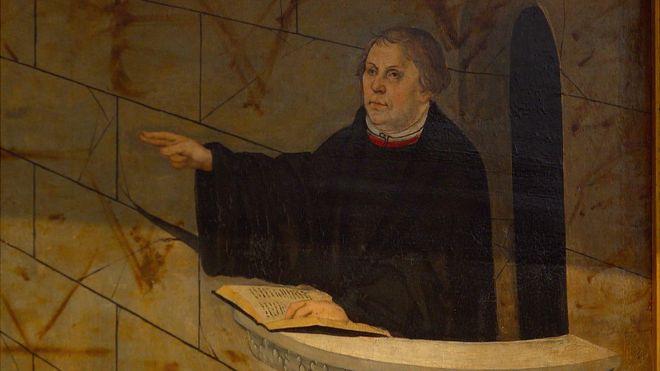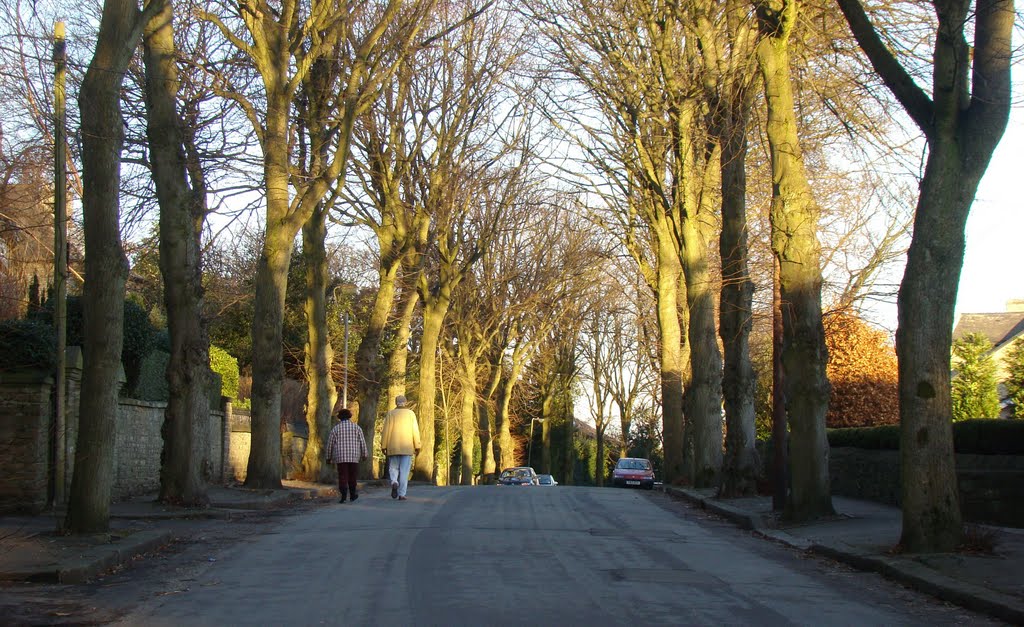- Details
- Written by: Kamran Mofid
- Hits: 1608
'The 500th anniversary of Lutheranism will pass unmarked in Britain. But it left a toxic and destructive legacy’

Martin Luther began the Protestant Reformation 500 years ago
Photo:bbc.co.uk
Giles Fraser:‘Brexit recycles the defiant spirit of the Reformation’

Martin Luther Preaching to Faithful, 1561, artist unknown
Photo:idler.co.uk
‘...it’s 500 years since the start of the Reformation. On 31 October 1517, Martin Luther nailed his 95 theses to the door of All Saints, Wittenberg, targeting corruption at the highest levels of the church. The scandal of which he complained was the sale of forgiveness to finance an ecclesiastical gravy train and lavish building projects such as that of St Peter’s in Rome. From here the Reformation would spread out to become an across-the-board protest at the elitist and centralising philosophy of the Roman church. Here also we find the intellectual roots of Euroscepticism.
…’Research by social scientist Margarete Scherer from the Goethe University in Frankfurt has demonstrated a considerably higher prevalence of Euroscepticism in traditionally Protestant countries than in traditionally Roman Catholic ones. And this should be entirely unsurprising, given that the Reformation was largely a protest about heteronomous power. “The bishop of Rome hath no jurisdiction in this realm of England” goes the 37th of the 39 articles of religion, still – officially, at least – a summary of the theology of the Church of England, of which the Queen is supreme governor.’...Continue to read
Martin Kettle: ‘How the Reformation sowed the seeds of Brexit’

Photo:premierchristianity.com
Five hundred years after he challenged the authority of the papacy by nailing his 95 theses to the door of a church in Wittenberg, Germany, Martin Luther no longer means much in the UK, this still supposedly Protestant country. The anniversary of Luther’s historic act of defiance on 31 October will pass mostly unremarked, certain to be eclipsed by the autumn trashfest that is the Americanised version of Halloween.
These days, the name Luther is more likely to invoke a TV detective series starring Idris Elba than the monk from a Saxon coalmining family who rocked Europe to its core half a millennium ago. The words Martin Luther are more associated with the great American civil rights leader than the man after whom Dr King was named.
To be fair, these islands have never had a mainstream Lutheran tradition like that in continental northern Europe or, later, north America. But the Reformation that Luther set in train absolutely had an effect here. In its English guise, it had a place for both freedom of worship and doctrinal strictness, humanism alongside sectarianism. It could be very cruel.
But at the centre of the English Reformation was England itself. The Reformation enabled early modern England to become, culturally and politically, the country that in important respects it still is. Protestantism was one of the foundation stones of the British state that evolved over subsequent centuries – and formally it still holds up the edifice of state today.’...Continue to read
Roy Hattersley: ‘The Reformation should have been a warning to Remainers’
‘If David Cameron had understood the causes and progress of the English Reformation he would have realised the appeal of ‘very well then, alone’

Photo:bing.com
‘We are told that, shortly after midnight on 24 June, 2016, when the European Union referendum result was declared, David Cameron and George Osborne – the true begetters of the squalid exercise in party management – were as surprised as they were disappointed. That was because they did not understand the character of the English people. They took it for granted that votes would be cast according to a calculation of whether membership of the European Union or withdrawal offered England the most prosperous future. But inhabitants of this fortress built by nature do not live by GDP alone.
Many of them have an ingrained belief in national sovereignty. England is at its best, the argument runs, when it is neither governed nor influenced by decisions taken in what Shakespeare called “less happier lands”. If Cameron and Osborne had understood the causes and progress of the English Reformation they would have realised the appeal of “very well then, alone”. The parallels are far from exact, but they are near enough to prove that the English believe in deciding things for themselves.
Although there was no accession treaty, the church in England took a formal decision to affiliate to the Church of Rome. At the Synod of Whitby in 664, the assembled clergy of Northumberland – a far larger area than the modern county – decided to adopt the Roman liturgy and the Roman calendar.
The rest of England followed suit and the unified Catholic Church was created. It remained happily subservient to Rome for nearly 900 years – rather longer than Britain maintained its allegiance to the Common Market that became the European Union.’...Continue to read
- Details
- Written by: Kamran Mofid
- Hits: 3230

Photo: dekhnews.com
Part I- First a bit of history about the Sheffield Trees

Tree lined Ranmoor Cliffe Road, Ranmoor, Sheffield S10
Photo:panoramio.com
It might seem as though Sheffield’s street trees have always been here, however most of the city’s highway trees were planted during the last 100 to 120 years.
Many were paid for, and planted by, Sheffield people who wanted the trees to brighten up their city.
- Some were paid for, a street at a time, by neighbourhood communities.
- Many were planted as living memorials to war-dead, as in Oxford Street, Crookesmoor.
- Grand avenues were planted by wealthy manufacturers.
- A few are remnants of ancient boundary-lines and field edges, and are still cherished as local landmarks by the communities around them.
Part II- Fast tracking to 2012
The £2.2 billion ‘Streets Ahead’ PFI contract was signed. This is a 25 year contract for highway, pavement and street light renewal, and includes the management of Sheffield’s highway trees.
Who signed the ‘Streets Ahead’ contract:
- Sheffield City Council (SCC) – some salaried Council Officers who worked on drafting the contract are still in place; some have since resigned.
- Amey Plc, owned by Ferrovial, a large international company based in Spain.
- The Department of Transport, who provided over one billion pounds of tax-payer’s money.
SCC has taken out loans to pay for half of the £2.2 billion contract. Financiers have transferred these loans from one banker to another as profitable assets. Sheffield Council Tax payers will be paying the interest on these loans for many years to come.
After the ‘Streets Ahead’ contract was signed, the previous 30 years’ worth of agreements negotiated with communities about the care of their street trees were lost or ignored...Continue to read by visiting Sheffield Tree Action Groups (STAG) website
Part III- Trees and us, Trees and our humanity
The philosophy of trees: From the Sheffield Tree Massacre to the Australian rain forest

‘Trees are looped into our history and our myths and our mentality’
Photo:independent.co.uk
From the Bible to Wordsworth, Blake to Sartre, Tolkien to Chomsky, woodland, culture, philosophy and humanity are inextricably bound. We came down from the trees aeons ago – but did we ever really leave them?
“I am not a tree,” says the beguiling Stellan Skarsgard in the recent film Return to Montauk. It seems obvious. Hard to argue with. And yet someone like Albert Camus is capable of saying, “I am the tree”. Which is not as absurd as it looks as first glance. We have an ancient and built-in tendency to compare ourselves to trees.
At the end of the 18th century, Toussaint L’Ouverture was the first slave rebel in history, or if not the first at least the first whose rebellion caught fire and stirred an entire nation – Haiti, then known as Saint Domingue – to revolt. Of course he ended up dying in a French prison for his troubles. In one way he was ahead of his time, in another he was rehearsing a time-worn analogy when he said – in a sentence that has become the Marseillaise of Haiti – “In overthrowing me they have cut down only the trunk of the tree of liberty; it will spring up again from the roots, for they are numerous and they are deep.” School kids in Haiti still recite those words. There is more than just metaphor here. The trope testifies to the interconnectedness of the human and the arboreal.
Which suggests that there is something fundamentally perverse about the Sheffield Tree Massacre. There appears to be a conspiracy between the Labour-run Sheffield Council and mindless profit-driven private company Amey plc to destroy the trees of Sheffield and cover the world in tarmac. Until recently, Sheffield was right up there among the most treed cities in the world (the number of trees per head of population or per square metre). The mad axemen (or chainsawmen) of Sheffield are not just anti-tree, they’re anti-human too. They hate existence, they hate life itself. They prefer concrete.
Trees are looped into our history and our myths and our mentality. When Yahweh in the Garden of Eden wants to speak of omniscience, he doesn’t speak of omniscience he speaks of a tree, the Tree of the knowledge of good and evil. When Adam and Eve have sex (a bad idea clearly) they do not have sex, they pluck the fruit from the Tree. The serpent who apparently talks them into it lives in the Tree too. The Tree says nothing, and yet in some sense says everything there is to say. Maybe this is why we fear the tree – because it reminds us of ourselves.’...Continue to read this excellent article
Part IV- Neoliberalism and the death of nature
Look to Sheffield: this is how state and corporate power subverts democracy

Photo:images.google.co.uk
‘One of neoliberalism’s promises was that it would free us from bureaucracy. By rolling back the state, it would vanquish the stifling power of officialdom, granting us unprecedented freedom and opportunity. This promise runs through the works of Friedrich Hayek and Milton Friedman, and Ludwig von Mises’ book Bureaucracy.
But in place of the old bureaucracy, it has created a state-corporate system more oppressive and intrusive than anything governments produced in the social democratic era. The hybrid nature of this system, protected from challenge by commercial confidentiality, property rights and civil law, places it beyond the reach of democracy.
The intermingling of state and corporate power allows corporations to harness the resources and protection of the state, and the state to hide behind its corporate partners. A classic example is the private finance initiative: a programme developed in the UK by the Conservatives but greatly expanded by Tony Blair and Gordon Brown. Under PFI, private companies finance and deliver public goods that governments would otherwise have provided.
We were told it would produce better services at lower cost, but the contracts have repeatedly put corporate demands ahead of public need. The debts afflicting hospitals and other parts of the public sector, as they are forced to keep paying for services they neither want nor need, were both foreseeable and foreseen.
Labour has now promised, if it takes office, to review all PFI contracts and buy them out if necessary. But the message has yet to filter through, even to some Labour councils.
A few days ago, in Sheffield with local campaigners, I toured the battle lines between people and profit. Sheffield has been described as Europe’s greenest city, but the council seems determined to change this through the massacre of many of its famous avenues of trees. In 2012, it signed a contract for what it called “the largest highways PFI programme in the UK” with Amey, a subsidiary of the vast Spanish company Ferrovial.’...Continue to read
The Time is Now to Stand Up for Mother Nature
Thus, please consider joining us at our International Conference in 2018

Photo:change.org
14th GCGI International Conference
And
The Fourth GCGI and SES Joint Conference, Lucca, Tuscany 2018
‘OUR SACRED EARTH: Spiritual Ecology, Values-led Economics, Education and Society Responding to Ecological Crisis’
- Details
- Written by: Kamran Mofid
- Hits: 2474
“Remember, no matter where you go, there you are.” – Confucius

Photo: Where do you find solitude in this hectic digital age?
“Today, in the world gone mad with gadgets and the so-called “Social Media”, people everywhere, it seems have no time left for themselves. No time for solitude, contemplation, reflection, thinking and meditation.
Today, everybody, young and old, is constantly Facebooking, tweeting, texting, Iphoning, IPadding, emailing, surfing the net, Goggling, Amazoning, and watching TV. Supposedly busy or indeed pretending to be!
All this, supposedly, to making us feel as if we are connected. But, connected to what, to whom and for what purpose? We do not know!
A pertinent question surely should be "What happens when constant communication replaces thoughtful reflection?" I'm not saying that the immediacy of the Internet is harmful, but rather how we tend to thrive on it. Instead of engaging with each other or just ourselves, it seems we are seeking something "out there" while ignoring real sustenance for thought.
In this ‘busy’ world, when we are virtually constantly connected to somebody else, somewhere else, then, where is the time for solitude, contemplation and connection between ‘Myself and Me’? To my mind, this must be the biggest question we should all ask of ourselves.
After all, "solitude gives us room, at least in the mind, to take a break from the churn."...Continue to read
...‘They seek out diversion and distraction. After all, if you don’t like being yourself, the television, the magazine, the iPod, or the Internet can quickly become an easy escape. This invited distraction breaks the silence and brings even more opportunity for discontent into our lives.
This is a shame. For there is great confidence to be found in contentment and solitude.’...

Photo and the caption above:Simplicity Begins in Us
Now, please continue to reflect more on what was noted above by reading the very excellent article below:
In a Distracted World, Solitude Is a Competitive Advantage
By Mike Erwin. This article was first published in Harvard Business Review on 19 October 2017

Photo:bing.com
“Always remember: Your focus determines your reality.” Jedi Master Qui-Gon Jinn shares this advice with Anakin Skywalker in Star Wars, but in our hyper-distracted work world, it’s advice that we all need to hear.
Technology has undoubtedly ushered in progress in a myriad of ways. But this same force has also led to work environments that inundate people with a relentless stream of emails, meetings, and distractions. In 2010, Eric Schmidt, then the CEO of Google, shared a concern with the world: “Every two days, we create as much information as we did from the dawn of civilization until 2003. I spend most of my time assuming the world is not ready for the technology revolution that will be happening soon.” Are we able to process the volume of information, stimuli, and various distractions coming at us each and every day?
A significant volume of research has outlined the problem with this onslaught of information. Research by the University of London reveals that our IQ drops by five to 15 points when we are multitasking. In his book, Your Brain at Work, David Rock explains that performance can decrease by up to 50% when a person focuses on two mental tasks at once. And research led by legendary Stanford University professor Clifford Nass concluded that distractions reduce the brain’s ability to filter out irrelevancy in its working memory.
There is no silver bullet to solving the complex problems ushered in by the information age. But there are some good places to start, and one of them is counterintuitive: solitude. Having the discipline to step back from the noise of the world is essential to staying focused. This is even more important in a highly politicized society that constantly incites our emotions, causing the cognitive effects of distractions to linger. In our book, Lead Yourself First, Ray Kethledge and I define solitude as a state of mind, a space in which to focus one’s own thoughts without distraction — and where the mind can work through a problem on its own.
The ability to focus is a competitive advantage in the world today. Here are some thoughts on how to stay focused at work:
Build periods of solitude into your schedule. Treat it as you would any meeting or an appointment. If you don’t schedule and commit to solitude, something else will fill the space. One need not be Henry David Thoreau here; 15-minute pockets of solitude are very effective. If we spend our entire workday sitting in meetings and answering emails, it leaves little space in our minds to do the hard thinking that is essential to good decision making and leadership.
Analyze where your time is best spent. Most of us have meetings that we can afford to miss, and most of us underutilize our energy because we have not allocated time to reflect and be rigorous about our priorities.
Starve your distractions. Social media, YouTube, and the limitless possibilities of the internet hang over our heads. They tempt us to click links that take us to another five-minute video or article. Acknowledge the ways that the internet lures you in, and then intervene by logging out of your social media accounts and blocking certain websites during work hours — especially the ones you use for a quick distraction “when you have 10 minutes to kill.”
Don’t be too busy to learn how to be less busy. One of the biggest reasons we struggle to focus is because we fill our schedules with too many commitments and we consistently prioritize urgent tasks over important ones. Leadership development and training opportunities exist to enhance your ability to understand yourself better, to reflect, and to grow. Don’t let the tempo of work get in the way of good development opportunities (once in a while).
Create a “stop doing” list. There are only so many hours in a day. As your to-do list grows, you cannot keep accumulating more tasks. Solitude gives you the space to reflect on where your time is best spent, which provides you with the clarity to decide which meetings you should stop attending, which committees you should step down from, and which invitations you should politely decline. This is something that Jim Collins, author of Good to Great, has been advising people to do for many years.
The volume of our communication, and our unfettered access to information and other people, have made it more difficult than ever to focus. Despite this reality, there is another truth: Opportunities to focus are still all around us. But we must recognize them and believe that the benefit of focus, for yourself and the people you lead, is worth making it a priority in your life. In other words, before you can lead others, the first person you must lead is yourself."
Mike Erwin is the co-author of Lead Yourself First: Inspiring Leadership Through Solitude and CEO of the Character & Leadership Center. He is also the president of The Positivity Project and a Lt. Colonel in the Army Reserve, assigned to the U.S. Military Academy at West Point as an Assistant Professor in Leadership & Psychology.
